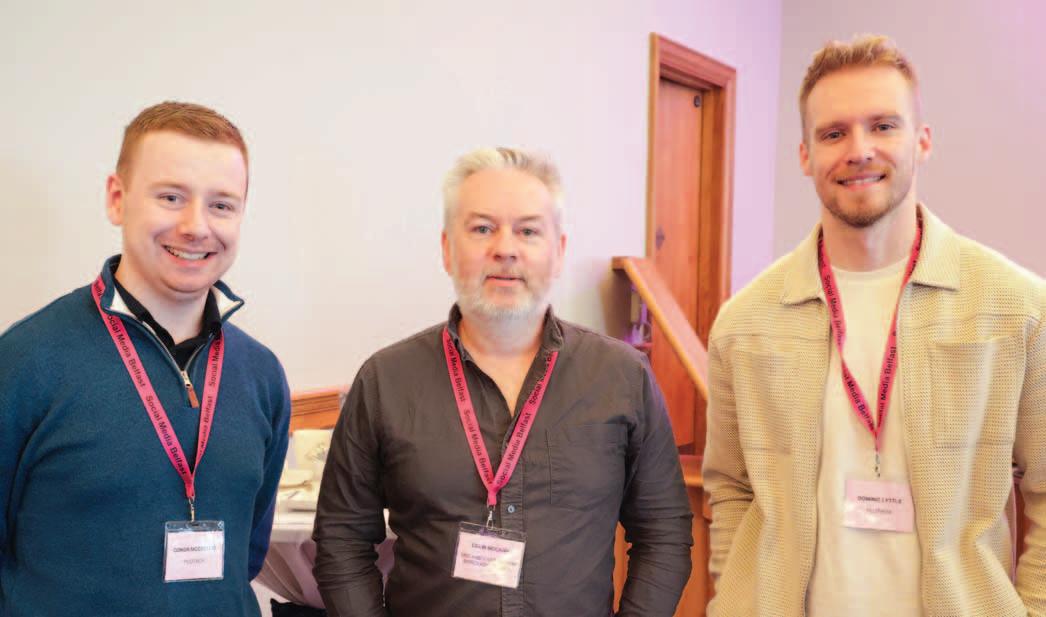





Delivering the workforce for the demands of the













Skills for the future report
Sponsored by




















Delivering the workforce for the demands of the green economy





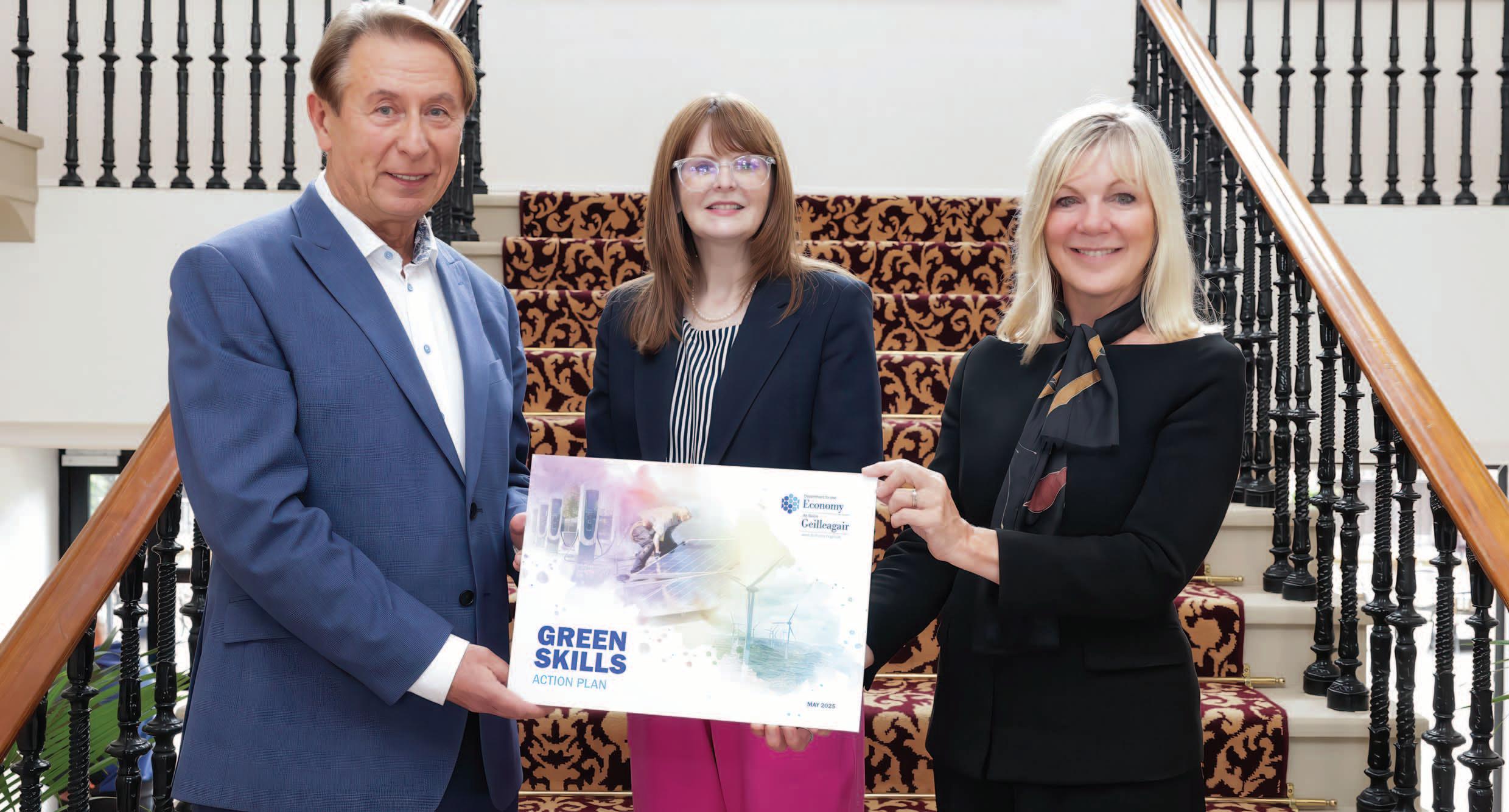







Delivering the workforce for the demands of the













Sponsored by




















Delivering the workforce for the demands of the green economy






In May 2025, the Green Skills Action Plan,developed by the Green Skills Delivery Group, was lanuched by Economy Minister Caoimhe Archibald MLA. Research related to the Action Plan indicates that the green economy will create 58,000 new jobs in Northern Ireland by 2035.
The Green Skills Delivery Group was established by the Department for Economy and is part of the Northern Ireland Skills Council (NISC). It was set up in recognition of the transition to net zero emissions and the subsequent need to shape the green sector workforce and provide skills insights. The delivery of a workforce capable of delivering the energy transition will contribute significantly to one of the Minister’s key objectives of her economic mission on decarbonisation.
NIE Networks’ Gordon Parkes, who is also Chair of the Green Skills Delivery Group, says: “In a fast paced and constantly evolving skills landscape there is a clear need for an actionable strategy to outline priorities and steps required to achieve our goals. To achieve net zero by 2050 requires a radical review of how we equip our workforce of
the future to meet these unprecedented challenges. It will take a combined and concerted effort from government, industry, and academia. Crucial to the implementation will be a commitment from all stakeholders to engage, collaborate, lead by example, and champion the cause of green skills for a sustainable future.”
The Action Plan provides a comprehensive framework to guide stakeholders as to what is needed to deliver the skills and the jobs for the future. It identifies 28 actions across four priority areas as follows:
• the skills eco system;
• a partnership approach to ensure a skills system that is responsive to changing needs;
• promoting awareness of careers; and
• opportunities in green jobs and green skills and developing a skilled workforce.






















Parkes explains it as presenting “a once in a generation opportunity to create an integrated green skills system that works effectively for individuals, business and the economy”.
To begin with its important to define what is meant by “green skills”.
The UK’s Green Jobs Taskforce defines it as “employment in an activity that directly contributes to – or indirectly supports – the achievement of the UK’s new zero emissions target and other environmental goals”.
While achieving net zero targets will require all of us to learn and adopt certain behaviours in our roles, there are others where the core function will be entirely focused on the achievement of those targets.
The Institute for Apprenticeships and Technical Education produced a useful Green Toolkit which captures the differing levels of green jobs and incorporates circular jobs.
Light green jobs refer to those where the core nature of the occupation will not change but some knowledge, skills and behaviours will need tweaked to support sustainable working such as a Care Assistant who will need to learn to sustainably dispose of equipment. Mid green jobs encapsulate those where the core nature of the occupation will not change but how it is applied could do completely. This would involve adding or
amending knowledge, skills and behaviours to support competence in new green technologies and approaches. An example of this would be an engineer who may need to learn new skills to move from carbon-based technologies to renewable but they will use the same core engineering principles and their job title will not change. Dark green jobs are entirely immersed in delivering nature and net zero ambitions and cannot do otherwise such as an energy manager, sustainability specialist, or ecologist, for example.
As industries seek to make their operations more sustainable and meet environmental regulations and consumer demand for greener products and services increases, green skills are becoming increasingly important.
The first priority in the Green Skills Action Plan refers to the interconnected network of educational institutions, training providers, employers, and individuals involved in skills development and workforce readiness – the skills eco system. Educating pupils at an early stage about green practices and building it into the curriculum at all educational levels will lay a foundation for future employment in green technologies, renewable energy and sustainable practices. It is a vital pillar given that the Employer Skills Survey 2022 found 13,700 vacancies difficult to fill due to a lack of applicants with the required skills, qualifications and/or experience. One of the key
















Delivering the workforce for the demands of the green economy





recommendations in the Action Plan is an urgent review of all the components of the skills eco-system to identify what is working well currently and the areas that require improvement and development.
The second priority focuses on a partnership approach that is responsive to changing needs – it reflects how varied and extensive the stakeholders are and how rapidly the green sector is evolving. A particular challenge is the age profile of the green sector which is higher than for some other sectors. Traditionally, those over 50 years of age are more reluctant to upskill and reskill something which will be necessary to support the transition to net zero. In common with the majority of sectors, the green sector is also facing a recruitment and retention challenge. One area of opportunity lies in the consistently high number of economically inactive individuals in Northern Ireland, a proportion of which wish to return to work but face barriers such as care commitments and disabilities. The contribution from government and employers in providing solutions to these hurdles will be a key consideration.
Creating an awareness of the opportunities that exist and making it easy for applicants to access the key information is the third priority. Young people, their parents and careers teachers will be key target audiences and their engagement will be essential to achieving the levels of employment predicted for the sector. A new careers portal will be an important aspect of this and will support ongoing existing programmes.
The final priority is the development of a skilled workforce which will help Northern Ireland to adapt to and achieve the transition to net zero and to build high value jobs thereby growing the economy. Building on research to date and responding to the changing skills, this group will ensure relevant training is provided at the appropriate time. Historical labour market transitions such as manufacturing to services, have taken place over decades however, the reskilling and transition of the workforce in construction, energy efficiency and renewables will need to be at pace.
The CITB NI’s Barry Neilson, Vice-Chair of the Delivery Group, is optimistic that the skills are there to be re-targeted: “As we focus on the need for a built environment that generates, transmits, and uses energy in a more sustainable way, the need for green skills will become more critical. These are the skills needed to create, power, and maintain our built environment. However, a great deal of the skills we have now within the construction sector now will remain relevant. What will need to change is how they are used. The underpinning knowledge that makes all the stages of design, delivery and maintaining our infrastructure and built environment will need to be “bolted on” to the existing craft and professional skills that are already well developed.






















“The Green Skills sector has a hugely exciting future but we need the best skilled talent and enthusiastic re-skilled experts to ensure the sector and the wider economy in Northern Ireland reaches its full potential.”
“Of course, there will be new roles and skills required to derive a more sustainable future, but these, in the main, will be a progression of the skills that the sector has already developed. That they are not entirely new does not belittle their importance and the need for continuous improvement both in skills and the way they are used. Rather it emphasises the journey of review and improvement that is second nature to the built environment and energy sectors. It is an area of strength for the construction sector that continuously develops and improves its people to deliver the needs of its clients.”
Initially the plan focuses on three of the green economic sectors: large-scale energy production, infrastructure, and domestic low carbon technologies and energy efficiency. A lot of the skills required for these sectors will be transferable to the other sectors, including specific skills in engineering and electrical as well as transversal skills such as leadership and management and project management.
Indeed, integrating green skills into all job sectors and not just those directly linked with the traditional green industries is crucial for fostering a sustainable economy. Delivering the relevant knowledge to each sector including the use of sustainable materials, waste reduction techniques, energy conservation, sustainable farming techniques and optimising supply chains to reduce emissions will help minimise the environmental impact and meet the net zero targets. Some work has already begun on the development of new modules in green skills and sustainability. By embedding green skills modules into training programmes and the curriculum from primary school level, individuals and organisations can gain the knowledge and
competencies to contribute to a sustainable future and reduce carbon emissions benefitting the economy and the environment.
The Green Skills Delivery Group have established four Lead Groups to progress on the recommendations in the Action Plan. This includes over 50 individuals involving representatives from employers, education, government, trade unions, and employers representatives.
“Skills are a fundamental enabler for the net zero target”, says Parkes, adding: “If we do not have enough people with the right skills it will not happen. The Green Skills sector has a hugely exciting future but we need the best skilled talent and enthusiastic re-skilled experts to ensure the sector and the wider economy in Northern Ireland reaches its full potential. It is important that all employers within the sector, government and the education sector collaborate effectively and take ownership of developing the talent pipelines. It is the right thing to do for our people and for the planet.”
W: www.nienetworks.co.uk
W: www.citbni.org.uk























Northern Ireland and the Republic of Ireland are both prioritising skills as a pathway to economic resilience and social mobility. However, the Assembly’s Public Accounts Committee (PAC) has outlined significant structural differences and varying levels of progress, cooperation, and mutual learning between both systems.
The PAC recently published two documents that examine skills strategy on either side of the border. Northern Ireland’s Developing the Skills for Northern Ireland’s Future examines the skills needs for Northern Ireland, highlighting challenges of delivery, governance, and data use.
Meanwhile, the Overview of the Current Skills Landscape in the Republic of Ireland, a briefing paper presented to the committee in January 2025, points to a more coordinated and well-resourced system in the Republic underpinned by stable institutional structures.
Northern Ireland’s current skills strategy – Skills for a 10x Economy, launched in 2022 – sets targets to raise qualification levels and lifelong learning participation by 2030. However, the PAC finds limited evidence that the
Department for the Economy (DfE) is on track to meet those goals. Only one annual monitoring report has been published, and while 30 of 50 actions have been completed, many key indicators remain stagnant or are regressing.
The report expresses concern that “significant acceleration is needed” on a new skills action plan and that the strategic goals are not sufficiently influencing programme delivery across departments.
In contrast, the Republic’s National Skills Strategy 2025, led by the Department of Further and Higher Education, Research, Innovation and Science (DFHERIS), is supported by clearly defined performance frameworks and dedicated funding. The National Training Fund (NTF), financed by a levy on employers,
enables a sustained investment in upskilling and reskilling, with a €1.485 billion funding package allocated for 2025-2030.
Northern Ireland’s skills system, the PAC says, is weakened by fragmented governance. A lack of coordination between DfE and the Department of Education (DE), particularly on the 1419 Framework, has resulted in duplication of provision, missed opportunities for collaboration, and an absence of joint planning mechanisms. The Committee was “deeply concerned” to find that previously collaborative practices between schools and further education (FE) colleges had become competitive.
By contrast, the Republic’s institutional landscape includes the National Skills Council, nine regional skills fora, and the Further Education and Training Authority (SOLAS), which together provide a structured and decentralised skills ecosystem. According to the OECD’s 2023 Skills Strategy Ireland report, these bodies represent international best practice in joined-up skills governance, with clearly assigned responsibilities across national and regional levels.
The PAC has called for DfE to reaffirm its commitment to the Skills Strategy, develop a stronger evidence base, and establish effective governance arrangements within the next 12 months. It also recommends urgent collaboration between departments to address duplication, share data on vulnerable learners, and build crosssector accountability.
Daniel McCrossan MLA, chair of the Public Accounts Committee says: “The Department for the Economy spends around £470 million on support for skills and learning – and has more than 370 staff working in this area. While it provides a broad range of skills programmes, there has been little progress towards or evidence of actually meeting the Skills Strategy’s goals.
“We are strongly of the view that the Department’s financial and staff resources could be used more effectively if there was better collaboration and a clearer focus on achieving strategic outcomes.”

















Delivering the workforce for the demands of the green economy






In June 2025, the Department for the Economy (DfE) and the Department of Education jointly published the Careers Action Plan 2025-2028, a new strategy setting out a framework aiming to modernise and integrate careers support across Northern Ireland.
The strategy responds directly to the 2022 Independent Review of Careers and reflects the recommendations from several key reports, including A Fair Start and the 14-19 Education and Training Framework. The plan’s primary objective is to establish a “universally accessible, high-quality careers system that supports people of all ages throughout their career journey”.
The action plan identifies seven key strategic outcomes:
• building a joined-up careers ecosystem;
• introducing careers education in primary schools;
• establishing quality standards;
• reforming delivery;
• strengthening provision for those with special educational needs (SEN);
• developing a careers portal; and
• enhancing engagement with parents, carers, and community partners.
The action plan highlights that careers support in Northern Ireland has traditionally focused on post-primary pupils, but now needs to address the full life course in response to changing labour market demands. The strategy cites the growing importance of reskilling, technological change, and the need to close the disability employment gap as drivers of reform.
The strategy sets out plans to formalise partnerships across government, education, and the community sector. This includes the creation of a joint
ministerial group to set priorities, along with a careers community stakeholder group and partnerships with labour market partnerships and the Children and Young People’s Strategic Partnership.
Cross-jurisdictional cooperation will be strengthened through engagement with the Four Nation Careers Group, the Careers Service of Ireland, and the Career Development Institute.
The introduction of careers education in primary schools is a core policy change. The Primary Futures programme is to be expanded to support learners aged between seven and 11, with a mixture of virtual and inperson employer engagement events.





















The action plan says that industry volunteers will be recruited to help deliver age-appropriate careers content, supported by new resources codeveloped with the Council for the Curriculum, Examinations and Assessment (CCEA) and the Careers Occupational Information Unit (COIU).
The strategy commits to the adoption of quality standards across all providers, including schools, further education, higher education, and the community sector.
A careers education delivery framework is to be developed in consultation with the Northern Ireland Schools and Colleges Careers Association to ensure consistency across schools. Teacher training programmes will be revised to include careers education content, and long-term workforce planning will be undertaken to address careers adviser recruitment.
Careers Occupational Information Unit (COIU) resources and bulletins will be expanded, and roadshow events will be delivered across area learning communities with the objective of strengthening local labour market intelligence.
The careers service will test new delivery methods aimed at providing a more agile, flexible model. This will include triage systems to prioritise support for those most in need and increased use of technology.
Delivery will be expanded to target adults, particularly those furthest from the labour market. The two department say they will explore integration with Department for Communities projects and local labour market partnerships.
Work experience provision will also be reformed. The action plan states that the two departments will explore the potential for a minimum work experience offer and develop a more streamlined administrative process with the Education Authority.
A specific focus is placed on enhancing careers support for SEN learners and vulnerable adults. New delivery models will be piloted, including repeated careers interventions for SEN pupils.
The Careers Service is to procure a digital tool for autistic learners, with the potential for future expansion to other SEN groups. Continuous professional development (CPD) for careers advisors will include updated SEN training and demographic awareness.
The departments say they will also explore the development of a SENspecific careers bulletin to provide targeted pathways and advice.
A new careers portal is to be developed aiming to provide a single digital entry point to careers support across the system. The portal will be co-designed with users and stakeholders and will incorporate gamification, AI, and accessible content for users of all ages.
The two departments have committed to complete a discovery phase in year one to determine technical requirements and will deliver the portal in years two and three. A user testing programme will be established, supported by the Careers Advisory Forum.
The strategy sets out plans to improve parental engagement at key stages, including parent-teacher events and transition planning for SEN learners.
Webinars and themed resources are to be developed for parents and carers, and a dedicated section of the new careers portal will provide information to support career conversations. Skills Barometer data will be made accessible to help parents understand employer needs and progression pathways.
The strategy’s delivery will be overseen by the Careers Advisory Forum, the Joint Ministerial Group, and the newlyformed stakeholder community. Annual reporting mechanisms will be established to monitor progress across all seven strategic outcomes.
The action plan includes delivery timelines, with most key actions to be developed or implemented between 2025 and 2028.
Initial investment will focus on the careers portal development, expansion of primary futures, work experience reform, CPD for careers advisers, and SEN-specific digital tools. Workforce planning and recruitment pipelines for careers advisers will be advanced in parallel.
The strategy positions careers as a central policy lever to improve skills alignment, promote social mobility, and support economic growth. The action plan says that the two departments will work with stakeholders across education, industry, and the community to deliver the proposed reforms.
In a joint statement, Economy Minister Caoimhe Archibald MLA and Education Minister Paul Givan MLA say: “The action plan outlines the steps needed to create a new careers system that benefits not only young people in skills and education but also adults and those furthest from the labour market.
They add: “Our vision is for a universally accessible, high-quality service that supports people across all stages of their career journey.”

When Construction Futures officially launched in August 2024, it set out to do more than raise awareness. Our mission, born from the EY Industry Skills Review and jointly led by employers through the Construction Employers Federation (CEF) and employee representatives Unite and GMB, was to inform, attract, develop and retain the people who will shape the built environment for decades to come.
Twelve months later, that mission has moved from concept to visible progress. Programmes are scaling, digital engagement is growing, and the conversation about skills is shifting from why to how.
Facing ongoing skills shortages and a complex training landscape, our first priority was to inform, dispel common misconceptions and attract new talent in a way that connects with today’s students and career-changers. Drawing on the Construction Employers Federation’s 2025 industry survey, our high-impact social media campaigns spotlight the roles employers need most – technical posts such as contracts managers, quantity surveyors, site managers, health and safety officers, and estimators, alongside trade careers including bricklayers, ground workers, plasterers, and plumbers.
These campaigns feature real people in Northern Ireland sharing their experiences, required skills, and the training routes to reach those jobs. Short videos and interactive posts break down salary bands and progression paths in formats younger audiences actually use, helping them see how to get started.
Since February 2025, Construction Futures has generated more than 2 million social media views, and feedback from schools and employers shows a clear rise in awareness in just over a year.
Building on that digital success, the upcoming Open Doors 2026 initiative (23 -28 March) uses an enhanced online platform to let schools and companies connect, book visits, and share resources reducing administration and widening participation across Northern
Ireland. Already, many employers have signed up to showcase live sites, offices and factories, giving pupils a first-hand look at the industry and giving businesses an efficient way to engage.
The rise in digital outreach is not just changing how we attract talent, it signals a deeper transformation within construction itself. A recent Association for Project Management survey shows that 75 per cent of project professionals now use AI in their projects, up from just 15 per cent two years ago. AI tools are increasingly applied to resource allocation, reporting and dashboarding, risk forecasting, schedule automation, and stakeholder communications.
Construction has historically been less automated than many other sectors and so the potential gains from AI and automation are significant, improved safety, greater efficiency, and support for an industry facing persistent skills shortages. However, without a shared definition of “digital construction,” stronger leadership, and clear standards, adoption could remain patchy and uneven.
As AI becomes embedded in planning, scheduling, safety assessments, diagnostics, and efficiency tools, new technical fluency is becoming essential. Even roles once considered nontechnical must understand how digital data informs decision-making. From site managers interpreting real-time analytics to quantity surveyors modelling cost scenarios, tomorrow’s workforce needs a comfort level with technology that was optional only a few years ago.
Technology alone cannot build a school, a bridge, or a home. Digital twins, robotics, and generative design are reshaping workflows, but the core of our industry remains human skill and creativity. Reports across the UK and Ireland are clear – automation will change tasks, but AI cannot physically build.
Bricklayers, joiners, plasterers, and site managers bring dexterity, judgement, and on the spot problem-solving that algorithms cannot match. Technical


specialists, estimators, surveyors, project managers are equally irreplaceable in interpreting data and coordinating complex builds. Recognising this is critical. As we adopt AI for planning, safety monitoring, and supply-chain optimisation, we must invest equally in the trades and technical expertise that keep projects real.
Northern Ireland’s apprenticeship data highlights that dual focus. The Department for the Economy’s ApprenticeshipsNI framework for 2024 shows an almost even split between trade and technical apprenticeships across Levels 2, 3 and Higher-Level Apprenticeships, an encouraging sign that both site-based and office-based careers are attracting interest. Training organisations are already reporting record intakes for trade apprenticeships the current academic year.
This strong uptake proves that young people are ready to build, yet apprentices already face hurdles: securing an employer sponsor for a course can be difficult, and bigger obstacles loom if the long-term pipeline of work is uncertain. Can the industry and government provide enough highquality placements and clear progression routes to meet demand, while also
guaranteeing a long-term pipeline of projects so those apprentices have work when they qualify?
The Department for the Economy recently launched a welcomed Apprenticeship Action Plan to make the system more effective and innovative, grow employer and learner participation, and widen access to groups traditionally excluded from employment. But without close collaboration from the Department for Infrastructure to guarantee a sustained pipeline of construction projects, those construction apprentices could still emerge into a market lacking opportunities.
Meeting this challenge requires joinedup action across government, education providers and industry – expanding apprenticeship capacity, aligning courses with real-world needs, and critically ensuring the work is there when apprentices qualify. Sustained infrastructure investment, quicker planning decisions and clear multi-year visibility of upcoming projects will decide whether today’s apprentices step into thriving careers or face yet another hurdle to clear.
E: info@constructionfuturesni.com
W: www.constructionfuturesni.com
S: linktr.ee/constructionfuturesni
















Delivering the workforce for the demands of the





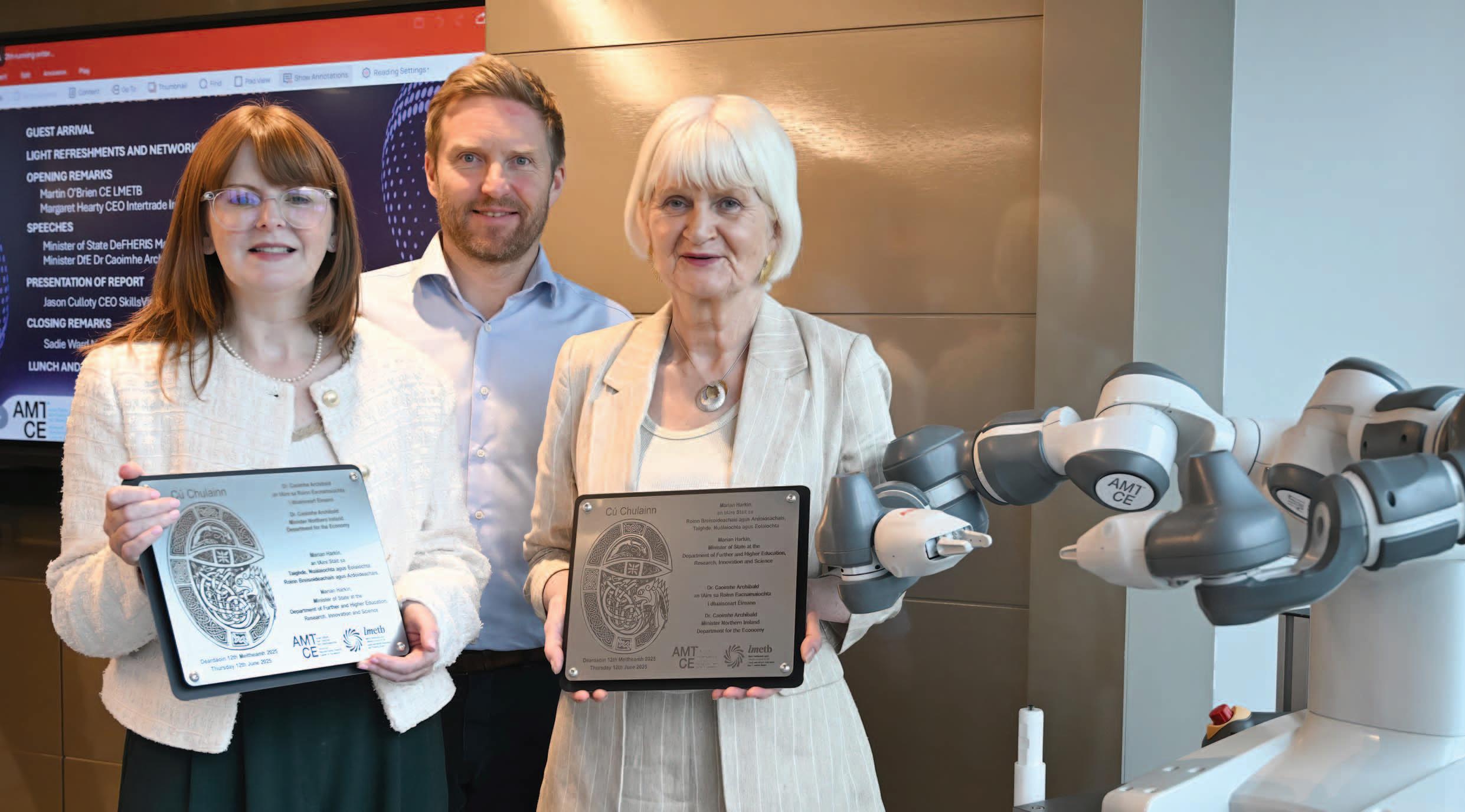
A report on future skills requirement in manufacturing across the island of Ireland has recommended urgent action be taken by both the Irish Government and the Northern Ireland Executive to address a skills shortage.
The All-Island 2025 Future Skills Report, published in June 2025, reveals that persistent and widening gaps exist in critical areas such as AI, process design, automation and robotics. Education and training systems are struggling to keep up with rapid technological change despite strong demand while industry struggles to attract new talent, particularly from underrepresented groups.
It also sets out a strategic goal of building an inclusive, collaborative and technologically responsive workforce emphasising that success will depend on increasing cross-border cooperation, modernising education systems and breaking down silos.
With 350,000 people employed in advanced manufacturing on the island of Ireland –90,000 in the North and 260,000 in the Republic – it is at the forefront of industry 4.0, referring to the connected and smart systems designed to support production in real time, increasing productivity, efficiency, and sustainability.














Launched at the Louth Meath Education and Training Board’s Advanced Manufacturing Training Centre of Excellence (AMTCE) in Dundalk on 12 June, the report was complied on behalf of the Advanced Manufacturing Training Centre of Excellence (AMTCE) at the Louth and Meath Education and Training Centre and the Advanced Manufacturing Innovation Centre at Queen’s University Belfast. Funding was provided by InterTradeIreland.
The launch was attended by Caoimhe Archibald MLA, Minister for the Economy and Marian Harkin TD, Minister of State for Further Education at the Department of Further and Higher Education, Research, Innovation and Science in the Irish Government.
• Growing skills gaps: While demand for advanced technical and transferable skills is rising, curricula and training lag behind. Engagement from young people, especially young women, is low; with those women being three times less likely to consider a career in advanced manufacturing than their male counterparts, with a lack of awareness of opportunities, alongside negative perceptions cited as factors
• Struggles in recruitment: Talent pipelines are being obstructed by a lack of visibility into career pathways alongside negative perceptions overall.








The mutual sharing of knowledge and expertise serves to benefit both the institutions and the individuals involved and strengthens the sector as a whole.”
Minister Caoimhe Archibald MLA
• System fragmentation: A lack of an all-island strategy, resulting in duplicated efforts, misaligned training, and limited cross-border collaboration.
• Education and industry are out of sync: Educators are struggling to respond to rapidly evolving industry needs with due haste, while employers are reporting difficulty accessing suitable training.
• Government and policymakers: Establish a joint All-Island Skills Taskforce coordinate policy and planning in both jurisdictions alongside the funding of crossborder apprenticeships with mutual recognition of qualifications, particularly automation and robotics. Investments in real-time labour market data systems are also recommended.
• Education and training bodies: Form an All-Island Curriculum Development Unit focusing on advanced manufacturing to accelerate development. Expand micro-credential offerings in smart manufacturing and digital skills and engage with students through industry exposure programmes and school pathways, particularly those aimed towards women and underserved communities.
• Industry: The sector should partner more actively with educators to offer work-based learning and shape course content. Support
national campaigns to modernise perceptions of manufacturing and highlight career opportunities.
Share facilities and resources, reducing duplication and expand access.
Minister Archibald welcomed the report: “Advanced manufacturing is a key priority area for the North’s economy. My department has a dedicated action plan for the sector and through the City and Growth Deals we are investing heavily.
“In parallel, I recognise the need for a pipeline of talented people who have the skills to enable the sector to further grow and flourish. We must continue to work together on an all-island basis. The mutual sharing of knowledge and expertise serves to benefit both the institutions and the individuals involved and strengthens the sector as a whole.”
Minister of State Harkin says: “The report clearly shows that the capacity to maintain and expand competitive manufacturing on the island will be determined by our ability to skill, upskill and re-skill.
“Cooperation between governments, industry and academia has already demonstrated that by pooling our expertise and resources we can achieve a lot. The emergence of a broad spectrum of opportunities from micro qualifications to apprenticeships reflects the value of this partnership approach.”

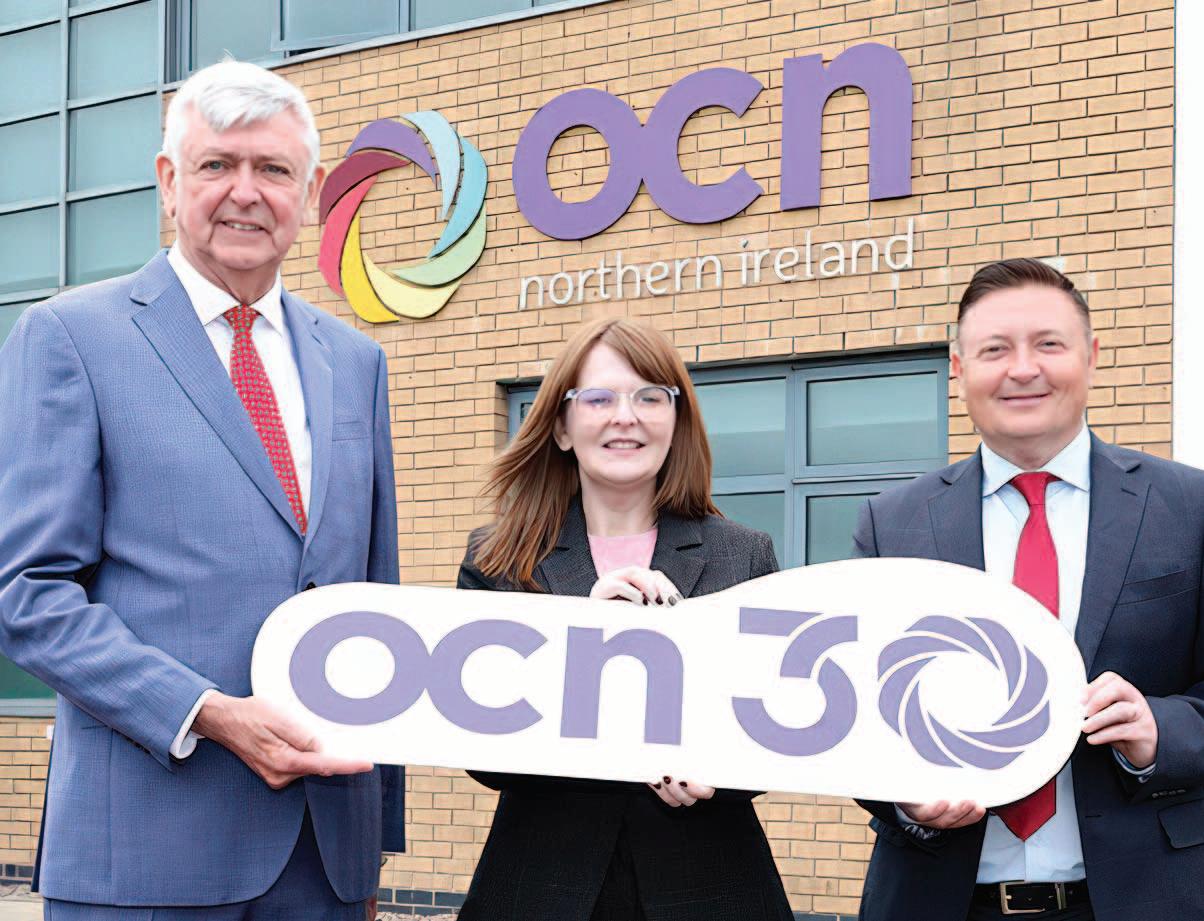
2025 marks a landmark year for the Open College Network Northern Ireland (OCN) as it celebrates three decades of transformative impact in education, skills development and community empowerment.
As Northern Ireland’s leading professional and vocational awarding body, OCN has developed and awarded qualifications that engage, enrich and equip learners for life. Since 1995, OCN has played a key role in shaping pathways to learning, employment, and personal growth and they have registered over 870,000 learners in over 700 accredited qualifications. OCN works with further education colleges, schools, private training providers, thirdsector organisations and more. Today,
OCN has firmly established itself as a cornerstone within Northern Ireland’s education ecosystem.
OCN develops qualifications that are responsive to the needs of learners, employers, and communities. These qualifications range from entry level up to Level 5 and support learners from all walks of life, helping young people in school pursue a vocational pathway,
college students, SEN young people studying for essential life skills, adults with learning disabilities, private training providers, apprenticeship and traineeship learners, learning hobbyists and more.
OCN CEO Martin Flynn is proud of the scale of evolution over the last three decades: “Today, OCN offers over 500 qualifications across a wide variety of subject areas, including ICT, health and social care, service enterprise, construction and hospitality. Our team is committed to developing qualifications that will improve the skillset of individuals, drive economic growth, and promote social mobility.”

OCN currently works with over 150 postprimary schools in Northern Ireland, supporting vocational pathways that focus on transversal skills, employability, entrepreneurship, science, religion, essential skills and more. Its longeststanding partners are the regional FE colleges in Northern Ireland, which collectively registered over 24,000 learners in the 2024/25 academic year alone. The colleges offer OCN qualifications for a range of learners, including university-bound students, vocational learners, and adult learners seeking essential skills.
Over the last 30 years, OCN has worked with over 150 Third Sector organisations. These organisations include women’s groups, homelessness charities, religious charities, youth groups, groups helping young offenders and former prisoners, and more. These organisations are the backbone of local communities and provide critical access to education for those most in need. OCN also works closely with private training providers to support external training and consultation, develop new qualifications and contribute to workforce
development in sectors facing labour shortages. OCN works collaboratively with their centres to build a successful, inclusive community where every learner matters.
OCN remains at the forefront of workforce development through its apprenticeships and traineeships that promote skills development and prepare learners for a career in diverse industries.
OCN apprenticeships include hospitality, business administration, working in adult social care, retail knowledge, and youth work. OCN traineeships include animal care, woodworking skills, transversal skills, travel and tourism, plumbing, hairdressing, engineering, wet trades, motor vehicle skills, and information technology.
These qualifications not only equip learners with the specialised skills needed for employment, but also provide employers with a pool of competent and motivated individuals ready to work.
OCN’s initiatives align closely with the Department for the Economy’s Apprenticeship Action Plan, reflecting a shared commitment to empowering learners, strengthening pathways to employment, and fostering inclusive education. The DfE Action Plan reflects OCN’s core values of accessibility, opportunity and lifelong learning. All OCN qualifications are designed to support a progressive pathway to apprenticeships, further education studies and employment.
OCN’s newly-launched green skills qualifications is a good example of OCN’s constant focus on being responsive to the needs of the local economy. OCN’s green skills qualifications aim to support the Northern Ireland workplace, allowing learners to study Level 2, 3, and 5 awards in green technologies and progress in further learning and/or employment.
Over the past 30 years, an estimated £476,000 has been awarded to OCN

learners and centres through bursaries and grants, underscoring OCN’s key role as an educational charity committed to equity and opportunity for all. OCN’s annual Learning Endeavour Awards honour the resilience and achievements of learners from all backgrounds. The awards provide learning bursaries to support learners in their educational journey, providing bursaries of £1,000 to winners and £500 to highly commended nominees. The Centre Learning Grants programme aims to support OCN’s centres, many of which are working without consistent funding or are unable to offer additional learning opportunities for their clients because of funding issues.
To mark its 30th anniversary, OCN has reaffirmed its strategic direction through three pledges:
Opportunity for all
Collaboration at the core
Nurturing innovation
Paul Donaghy, OCN Chairperson adds: “OCN is proud to reaffirm its commitment to education and skills
development in Northern Ireland that reflect our dedication to breaking down barriers to learning, strengthening collaborative partnerships and creating forward-thinking approaches to vocational and technical education. These pledges reflect OCN’s dedication to breaking down barriers to learning, strengthening collaborative partnerships and creating forward-thinking approaches to vocational and technical education.”
As OCN enters its fourth decade, it will continue to expand its range of qualifications in key growth areas such as digital technology, green energy, advanced manufacturing and health and social care.
Through strong collaboration with industry, government, and education providers, OCN will ensure its qualifications remain relevant, futurefocused and responsive to the evolving labour market.

T: 028 90 463 991
E: info@ocnni.org.uk
W: www.ocnni.org.uk
















Delivering the workforce for the demands of the green economy






The Department for the Economy (DfE) states that the Green Skills Action Plan, published in late-May 2025, aims to “equip individuals with the knowledge and skills needed to support a sustainable, low carbon economy”.
It sets out a framework aiming to develop the skills base required to support Northern Ireland’s green economy and the statutory pathway to net zero.
The Action Plan, developed by the Northern Ireland Skills Council (NISC) and its Green Skills Delivery Group, sets out key priorities and policy actions to be delivered across the current Assembly mandate and beyond. It responds to sectoral skills gaps identified in the 2023 Energy Skills Audit and is aligned with the Department’s Energy Strategy: Path to Net Zero Energy, published in 2021.
The plan prioritises targeted interventions in three initial focus areas: large-scale energy production, infrastructure, and domestic low-carbon technologies and energy efficiency. These sectors are deemed critical to achieving the Executive’s legally binding target of reducing energyrelated emissions by 56 per cent by 2030 and reaching net zero by 2050.
The Action Plan identifies 28 actions structured around four key priority areas: strengthening the skills ecosystem, developing cross-sector partnerships, promoting awareness of green careers, and building a skilled green workforce. The document also recognises the need for system flexibility, cross-departmental collaboration, and sustained industry engagement to ensure that the skills system remains responsive to evolving green sector demands.




















The Green Skills Delivery Group, chaired by NIE Networks executive director Gordon Parkes, will be tasked with overseeing the implementation and monitoring of the Action Plan.
The Green Skills Action Plan is structured around four central priorities:
1. Skills ecosystem: Developing a more integrated and accessible green skills landscape.
2. Partnerships: Building collaborative frameworks between government, industry, and education providers.
3. Awareness: Increasing public and stakeholder understanding of green job opportunities and skills pathways.
4. Workforce development: Supporting the upskilling, reskilling, and transition of the existing workforce into green sectors.
A key component of the plan is the modernisation of the skills ecosystem to ensure it can meet the growing demand for green competencies. The Green Skills Delivery Group will contribute to ongoing reviews of Northern Ireland’s regional skills offering, with a specific focus on future-proofing apprenticeship frameworks and vocational pathways.
Short-term actions outlined in the Action Plan include the establishment of a ‘green cluster’ of sectoral experts, a central information hub for green skills, and scoping for a green skills curriculum hub to coordinate provision across further and higher education. Additional commitments include the review of apprenticeship frameworks relevant to green sectors and the development of competency pathways to support career progression.
The plan identifies the integration of green skills into curricula from primary school through to higher education as an ongoing requirement.
The Action Plan stresses the importance of a crossgovernment, cross-sector partnership model to deliver green skills at the scale required. A net zero communications group is to be established to coordinate messaging and provide system-wide leadership on green skills promotion.
Dedicated employer and trade union groups will be formed for each of the three priority sectors to inform skills planning, support worker transition, and develop new career pathways. The Green Skills
Delivery Group is to collaborate closely with the Department for Communities, Labour Market Partnerships, and City and Growth deals aiming to align skills interventions with employment programmes.
The plan acknowledges the challenges associated with engaging economically inactive groups, particularly those aged between 50 and 64, and proposes targeted employer engagement to address these barriers.
The Action Plan places strong emphasis on improving the visibility of green careers. Key short-term actions include the development of green sector career bulletins and the creation of employer-led promotional materials targeted at schools, with a particular focus on increasing female participation.
Work experience opportunities in the green sector are to be expanded for young people, career changers, and people classified as ‘economically inactive’. The plan also identifies the need to promote the transferability of skills from declining industries into green sectors and highlights the role of businesses in providing industrial experience to students through guest lectures and placements.
The plan outlines a series of actions to support upskilling and reskilling in high-demand green sectors. These include the delivery of targeted training programmes in digital, transversal, and zero-carbon skills and the facilitation of inter-industry partnerships to fast-track training.
The Green Skills Delivery Group has committed to supporting pathways into the sector for those already in the workforce, as well as new entrants and those transitioning from traditional industries. Programmes such as Skill Up, Skills Focus, and the Joint Utilities Entry Level Programme will be used to support delivery.
Recognising the demographic challenge facing the green sector, the plan proposes the development of initiatives to capture knowledge from older workers and retired industry experts, particularly in niche roles.
The delivery of the Green Skills Action Plan will be overseen by the Green Skills Delivery Group, supported by sub-groups aligned to each of the four priority areas. Each action is assigned a lead organisation and a delivery timeframe. Progress will be reported to the Northern Ireland Skills Council at each of its meetings.
The Green Skills Action Plan is intended to be a living document, subject to regular review and amendment to reflect sectoral developments, policy updates, and emerging technologies. The Department has




















the workforce for the demands of the green economy


emphasised the need for flexibility to adapt to changing skills requirements over the life of the plan.
The Green Skills Delivery Group has identified a range of existing delivery mechanisms and funding streams to support implementation. These include the Skill Up programme, which provides fully funded courses in green technologies, and the Skills Focus initiative, which supports upskilling for SMEs.
Funding opportunities through Labour Market Partnerships, City and Growth deals, and the PeacePlus programme are also referenced, along with the potential to engage private training providers in the delivery of specialist green skills.
Further work is planned to explore the potential for embedding green skills criteria in public sector contracts to promote sustainability across government procurement.
The Action Plan prioritises three green sectors with immediate skills needs:
• large-scale energy production (including renewables, thermal generation, and energy storage);
• infrastructure (electricity, gas, water networks, and waste management); and
• domestic low-carbon technologies and energy efficiency (including heat pump installation, insulation, EV charging, and solar PV).
Occupational heat maps have been developed for each sector to quantify projected skills demand and anticipated recruitment challenges through to 2030.
The Action Plan states that DfE and the Green Skills Delivery Group will use these data to prioritise training delivery and inform the sequencing of future interventions.
The Action Plan identifies a number of structural challenges that will need to be addressed to meet green sector demand. These include:
• misalignment between the current skills system and net zero objectives;
• limited regional availability of green skills training;
• a shortage of skilled labour in key occupations, particularly engineering and electrical roles;
• difficulties in attracting new entrants to the sector;
• retention of skilled workers in the face of competition from other jurisdictions;
• an ageing green workforce and low participation in lifelong learning among older workers; and
• low public awareness of green careers and available training pathways.
The plan notes that overcoming these challenges will require improved coordination, sustained investment, and cross-sectoral collaboration.
The green transition presents significant opportunities for employment growth and economic development in Northern Ireland. The Northern Ireland Audit Office’s Skills Audit Report projects that employment in green-aligned sectors will increase by approximately 15 per cent by 2035, with some industry forecasts suggesting that up to 58,000 new green jobs could be created over the next decade.
The plan identifies opportunities for greater cross-border collaboration on green skills with counterparts in the Republic of Ireland and the UK, including joint participation in the PeacePlus programme.
DfE has also signalled that clearer policy commitments and funding certainty, particularly in relation to energy efficiency and housing decarbonisation, will be critical to unlocking private sector investment in skills development.
The Green Skills Action Plan provides a detailed framework to support Northern Ireland’s transition to a sustainable, low-carbon economy. It sets out a coordinated programme of skills interventions to address the region’s immediate labour market needs, while building the longer-term capacity required to meet net zero targets.
While the Action Plan acknowledges the scale of the delivery challenge, it also highlights the significant opportunities available to build a green, inclusive workforce and contribute to regional economic growth.
The success of the Action Plan will depend on sustained collaboration across government, industry, and education providers, underpinned by flexible delivery mechanisms and a commitment to continuous review. The next phase will focus on operationalising the strategy, scaling up training provision, and aligning skills development with the Executive’s broader decarbonisation agenda.
Gordon Parkes, Chair of the Green Skills Delivery Group, says: “The transition to net zero presents a oncein-a-generation opportunity to build a resilient, adaptable workforce that can support Northern Ireland’s economic growth while delivering on our environmental commitments. The Green Skills Action Plan provides the roadmap, but its success will depend on the shared commitment of all partners to lead, engage, and deliver.”
Minister for the Economy Caoimhe Archibald MLA says that the action plan “will create pathways into the green economic sectors and ensure the skills are developed to meet the needs of industry”.
She adds: “The Green Skills Action Plan represents an important step in equipping business and individuals with the capabilities to drive the transition to net zero.
“By investing in skills and our people, we are also investing in the environment, leading to a reduction in carbon emissions and a more prosperous and sustainable future for us all.”





Northern Ireland is at an inflection point.
Conversations around green skills, digital skills, vocational pathways and AI dominate the agenda, as they should. But beneath these headline priorities lies another skillset, rarely mentioned yet indispensable: the linguistic and cultural skills that enable public services to function in a more diverse society, writes Paolina Hawthorne, Managing Director, Diversity NI.
As the Skills Barometer 2023-2033 reminds us, demand for new skills will keep evolving alongside economic and demographic change. One change already reshaping daily life is our multilingual reality.

In classrooms, hospitals, courtrooms, and job centres, the presence of service users who speak Tetum, Bengali, Malayalam, Somali, Amharic, Oromo, Greek, Latvian, Polish, and Lithuanian are amongst the 75 languages that are in demand in Northern Ireland in the past years and no longer unusual. It is the new norm.
Provision of interpreters and translators across the public sector remains a challenge. Not because the need is unclear, but because reliable delivery at scale requires both a skills pipeline and operational agility. If language support falters, access to justice, health equity, workforce participation and ultimately economic inclusion are compromised.

This is where Northern Ireland’s skills debate must broaden. The conversation cannot only be about coding bootcamps or green apprenticeships. It must also be about investing in the professional development of interpreters, building rare language capability, and ensuring our systems can respond in minutes, not days.
For over 15 years, Diversity NI has been part of the behind-the-scenes infrastructure underpinning public service delivery:
Maintaining a live pool of trained, qualified interpreters, including rare languages often overlooked.
Delivering a 99.7 per cent success rate, backed by systems that place an interpreter within 20 minutes when the public sector calls.
Supporting not only communication, but the economic participation of communities whose skills and labour also drive growth.
And crucially, our role does not begin and end with contracts. Public bodies often rely on us, both within and outside framework agreements, when delivery falls short elsewhere. We step in, steady
the service, and ensure that standards are upheld. That is why our reputation rests on more than numbers.
It is built on dependability, capability, and the confidence that when it matters most, Diversity NI is the expert in the room and the partner that keeps the system moving. This is not just about ‘language services’, it is about futureproofing Northern Ireland’s economy and public services.
If the 2020s are about building resilience, then language access is resilience. It keeps healthcare safe, courts functional, and workplaces inclusive. Interpreting is not a support service. It is an economic necessity.
T: 028 9047 3737
E: info@diversityni.co.uk
W: www.diversityni.co.uk

















Delivering the workforce for the demands of the green economy



Figures released by the Department for the Economy show that more young people are availing of the Skills for Life and Work programme to gain experience, training, and skill sets tailored to their needs.
Participants by sex
• Male 1,713
• Female 1,151
• Total 2,864



Participants by disability status
• Disability declared 51 per cent
• No disability declared 49 per cent


Age of participants upon commencement of programme
• 16: 55 per cent
• 17: 31 per cent
• 18: 7 per cent
• 19 plus:7 per cent

































Participants by economic background
• Percentage quintile 5 (least deprived) 7 per cent
• Percentage quintile 4 12 per cent
• Percentage quintile 3 14 per cent
• Percentage quintile 2 20 per cent
• Percentage quintile 1 (most deprived)46 per cent
Skills obtained in 2024/25
• Literacy 445
• Numeracy 508
• ICT 506
• Employability 573
• Personaland social development 566
• Professionaland technical537
Participation by local authority
Rate per 100,000
• Belfast 312
• Derry City and Strabane 213
• Antrim and Newtownabbey 124
• Armagh City,Banbridge and Craigavon 104
• Mid and East Antrim 93
• Lisburn and Castlereagh 86
• Mid Ulster 86
• Newry,Mourne and Down 82
• Ards and North Down 81
• Causeway Coast and Glens 80
• Fermanagh and Omagh 77
Deprivation
Coast and Glens
City and Strabane

Antrim and Newtownabbey
and Castlereagh
Fermanagh and Omagh Newry, Mourne and Down Armagh City, Banbridge and Craigavon



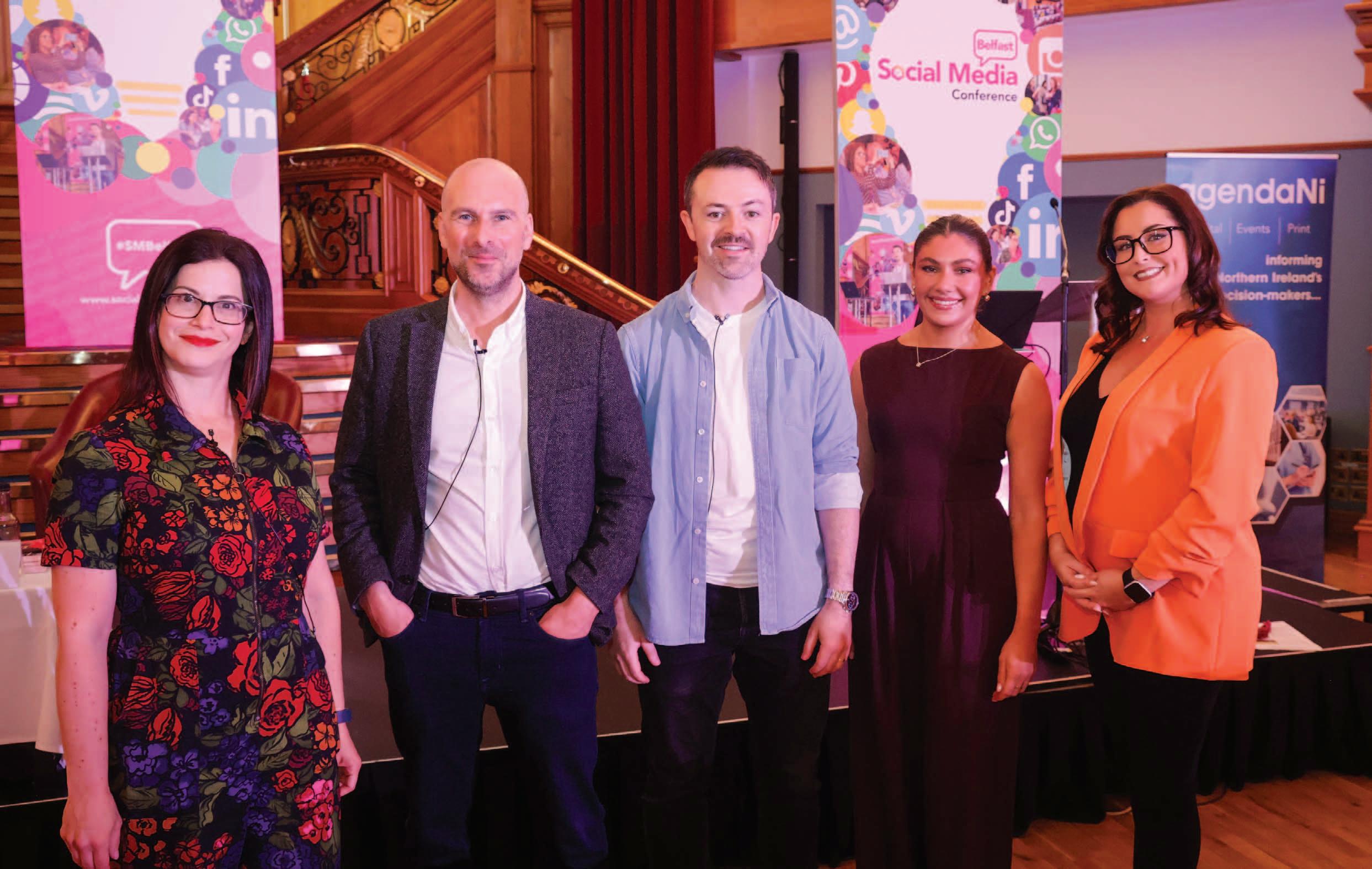
The 11th annual Social Media Belfast Conference took place in September 2025. The event is Northern Ireland’s leading social media event and brought together an excellent lineup of social media experts both local and visiting from across different sectors to share their knowledge and examples of successful campaigns.
A massive thank you to all speakers and delegates who joined us at the 2025 Social Media Belfast in Titanic Belfast and made the conference a huge success!
We have already started brainstorming for 2026. If you are interested in sponsoring, exhibiting or sharing your experiences as a speaker please do get in touch with us, info@agendani.com.






